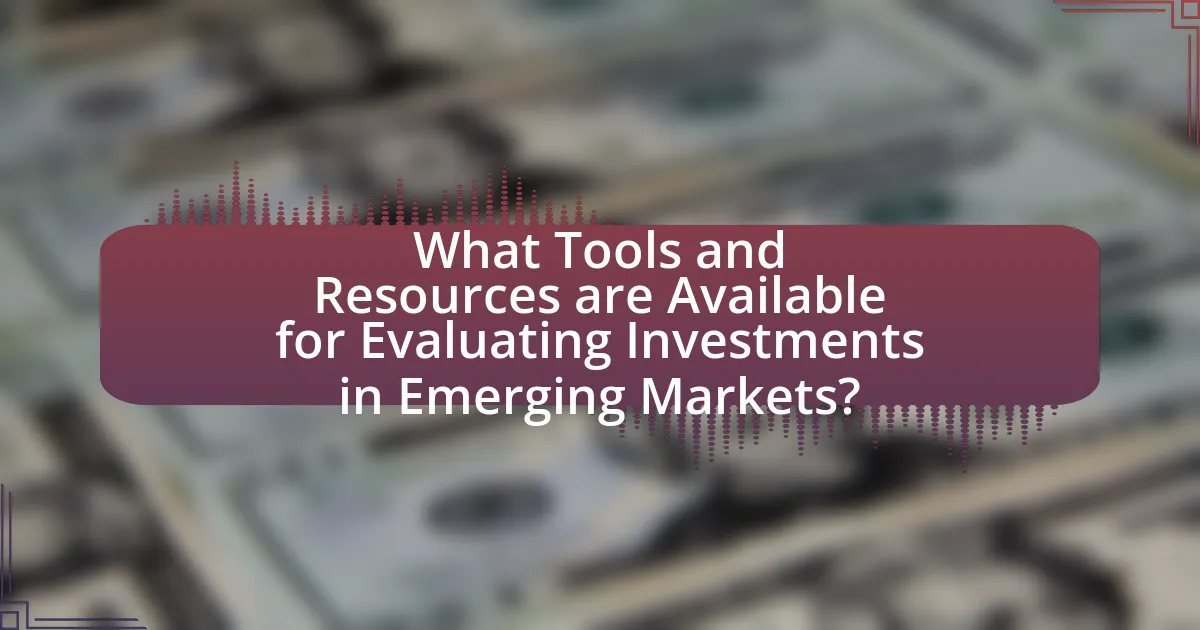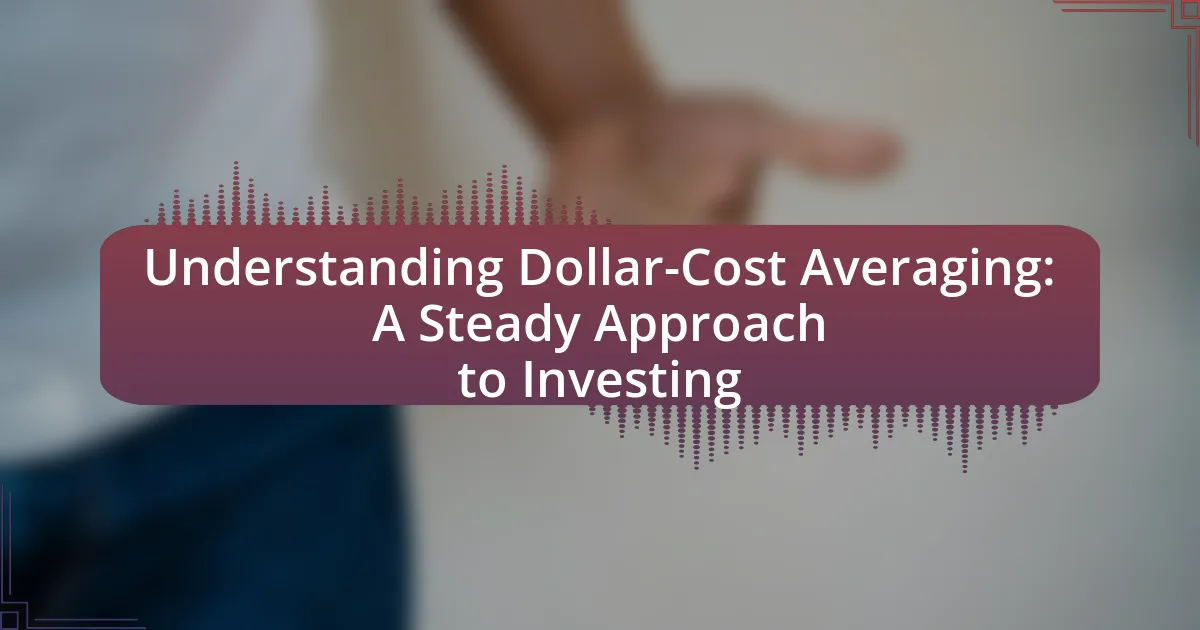The article focuses on evaluating investment opportunities in emerging markets, highlighting sectors such as technology, consumer goods, infrastructure, and renewable energy that present significant growth potential. It contrasts emerging markets with developed markets, emphasizing their higher growth rates, market volatility, and unique regulatory environments. Key factors driving growth in these regions include economic reforms, foreign direct investment, and favorable demographic trends. The article also discusses the importance of economic indicators in investment decisions, the potential for higher returns, associated risks, and best practices for conducting due diligence. Additionally, it outlines tools and resources available for investors to assess market trends and financial health, ultimately guiding informed investment strategies in emerging markets.

What are Investment Opportunities in Emerging Markets?
Investment opportunities in emerging markets include sectors such as technology, consumer goods, infrastructure, and renewable energy. These markets often exhibit higher growth rates compared to developed economies, driven by factors like increasing urbanization, a growing middle class, and advancements in technology. For instance, according to the International Monetary Fund, emerging markets are projected to grow at an average rate of 4.5% annually, significantly outpacing the growth of developed markets. Additionally, the World Bank highlights that investments in infrastructure in these regions can yield substantial returns, as many countries are in dire need of modernization and expansion of their facilities.
How do emerging markets differ from developed markets?
Emerging markets differ from developed markets primarily in their economic growth potential, market volatility, and regulatory environments. Emerging markets, such as Brazil and India, typically exhibit higher growth rates due to factors like increasing consumer demand and industrialization, while developed markets, like the United States and Germany, tend to have slower growth rates due to their already established economies. Additionally, emerging markets often experience greater market volatility, influenced by political instability and economic fluctuations, whereas developed markets generally offer more stability and predictability. Regulatory environments in emerging markets can be less mature, leading to challenges such as less transparency and weaker enforcement of laws compared to the more robust regulatory frameworks found in developed markets.
What factors contribute to the growth of emerging markets?
The growth of emerging markets is primarily driven by economic reforms, increased foreign direct investment (FDI), and demographic trends. Economic reforms, such as deregulation and privatization, enhance market efficiency and attract investment. For instance, countries like India and Vietnam have implemented significant reforms that have led to substantial GDP growth rates, with India averaging around 7% annually over the past decade. Increased FDI, which reached approximately $1.5 trillion in 2021 for emerging economies, provides capital and technology transfer, further stimulating growth. Additionally, favorable demographic trends, including a young and growing workforce, contribute to increased consumption and productivity, as seen in countries like Nigeria and Indonesia, where a large percentage of the population is under 30 years old. These factors collectively create a conducive environment for sustained economic expansion in emerging markets.
How do economic indicators influence investment decisions in these markets?
Economic indicators significantly influence investment decisions in emerging markets by providing essential data on economic health and growth potential. Investors analyze indicators such as GDP growth rates, inflation rates, unemployment rates, and consumer confidence to assess the viability of investments. For instance, a rising GDP indicates economic expansion, which can attract foreign investment, while high inflation may deter investors due to potential erosion of returns. Historical data shows that countries with stable economic indicators, like Brazil and India, have seen increased foreign direct investment, demonstrating the correlation between positive economic indicators and investment attractiveness.
Why should investors consider emerging markets?
Investors should consider emerging markets due to their potential for higher returns compared to developed markets. Historically, emerging markets have outperformed developed markets, with the MSCI Emerging Markets Index showing an average annual return of approximately 10% over the past two decades, compared to around 7% for the MSCI World Index. Additionally, emerging markets often present opportunities for diversification, as they are less correlated with developed markets, which can reduce overall portfolio risk. The rapid economic growth in countries like India and Brazil further supports the case for investment, as these economies are projected to expand at rates significantly higher than those of developed nations.
What potential returns can be expected from investments in emerging markets?
Investments in emerging markets can yield potential returns that significantly exceed those of developed markets, often ranging from 5% to 15% annually, depending on various factors such as economic growth rates and market conditions. For instance, according to the International Monetary Fund, emerging markets are projected to grow at an average rate of 4.5% compared to 2% for advanced economies, which can lead to higher returns on equity investments. Additionally, historical data from the MSCI Emerging Markets Index shows that over the past decade, the index has delivered an average annual return of approximately 10%, highlighting the potential for substantial gains in these markets.
What risks are associated with investing in emerging markets?
Investing in emerging markets carries several risks, including political instability, economic volatility, currency fluctuations, and regulatory challenges. Political instability can lead to abrupt changes in government policies, affecting investment security; for instance, countries like Venezuela have experienced significant economic downturns due to political turmoil. Economic volatility is evident in the fluctuating GDP growth rates of emerging markets, which can be unpredictable compared to developed economies. Currency fluctuations pose a risk as well, as investments can lose value when local currencies depreciate against major currencies like the US dollar. Additionally, regulatory challenges may arise from inconsistent enforcement of laws and regulations, which can hinder business operations and investor confidence. These factors collectively contribute to the heightened risk profile of emerging market investments.

How to Identify Viable Investment Opportunities in Emerging Markets?
To identify viable investment opportunities in emerging markets, investors should conduct thorough market research, analyze economic indicators, and assess political stability. Market research involves understanding local consumer behavior, industry trends, and competitive landscapes, which can reveal sectors with growth potential. Economic indicators such as GDP growth rates, inflation, and employment statistics provide insights into the market’s health; for instance, according to the World Bank, many emerging markets have experienced GDP growth rates exceeding 5% annually in recent years. Political stability is crucial, as it affects investment risk; countries with stable governments and transparent regulations tend to attract more foreign investment. By combining these analyses, investors can pinpoint sectors and companies that are likely to yield favorable returns in emerging markets.
What criteria should be used to evaluate investment opportunities?
To evaluate investment opportunities, one should consider criteria such as market potential, financial performance, management quality, competitive advantage, and risk assessment. Market potential involves analyzing the growth prospects of the industry and the target market size, which can be validated by reports from organizations like the International Monetary Fund that project economic growth rates. Financial performance includes reviewing historical financial statements for profitability and cash flow, with benchmarks from industry averages providing context. Management quality assesses the experience and track record of the leadership team, which can be corroborated by their previous successes or failures in similar ventures. Competitive advantage examines unique selling propositions or barriers to entry that can sustain profitability, supported by market analysis reports. Lastly, risk assessment involves identifying potential risks, including political, economic, and operational factors, which can be substantiated by country risk ratings from agencies like Moody’s or Standard & Poor’s.
How do political and economic stability affect investment viability?
Political and economic stability significantly enhance investment viability by creating a predictable environment for investors. When a country exhibits stable governance and sound economic policies, it reduces risks associated with investments, such as sudden regulatory changes or economic downturns. For instance, according to the World Bank, countries with stable political systems tend to attract more foreign direct investment (FDI), as evidenced by the increase in FDI flows to nations like Singapore and Switzerland, which maintain strong political and economic frameworks. Furthermore, stability fosters investor confidence, leading to increased capital inflows and long-term investment commitments, as seen in the consistent growth of investment in countries with low political risk ratings.
What role does market accessibility play in investment decisions?
Market accessibility significantly influences investment decisions by determining the ease with which investors can enter and operate within a market. High market accessibility typically attracts more investors, as it reduces barriers such as regulatory hurdles, infrastructure limitations, and logistical challenges. For instance, according to the World Bank’s Ease of Doing Business Index, countries with higher rankings in market accessibility often experience increased foreign direct investment (FDI). This correlation indicates that investors prioritize markets where they can efficiently establish and manage their operations, thereby enhancing their potential for returns.
How can investors assess the financial health of companies in emerging markets?
Investors can assess the financial health of companies in emerging markets by analyzing key financial metrics such as revenue growth, profit margins, and debt levels. These metrics provide insights into a company’s operational efficiency and financial stability. For instance, a study by the International Finance Corporation (IFC) highlights that companies with consistent revenue growth and manageable debt levels are more likely to withstand economic fluctuations. Additionally, investors should evaluate cash flow statements to understand liquidity and operational cash generation, as positive cash flow indicates a company’s ability to sustain operations and invest in growth. Furthermore, comparing these metrics against industry benchmarks can help investors gauge a company’s performance relative to its peers in the emerging market context.
What financial metrics are most relevant for evaluation?
The most relevant financial metrics for evaluation in emerging markets include return on investment (ROI), net present value (NPV), internal rate of return (IRR), and earnings before interest, taxes, depreciation, and amortization (EBITDA). ROI measures the profitability of an investment relative to its cost, providing a clear indication of financial performance. NPV calculates the difference between the present value of cash inflows and outflows, helping investors assess the value of future cash flows. IRR represents the discount rate that makes the NPV of an investment zero, indicating the potential growth rate of the investment. EBITDA offers insight into a company’s operational efficiency by focusing on earnings generated from core business activities, excluding non-operational expenses. These metrics are essential for making informed investment decisions in emerging markets, where financial stability and growth potential can vary significantly.
How can investors analyze market trends and consumer behavior?
Investors can analyze market trends and consumer behavior by utilizing data analytics, market research, and consumer surveys. Data analytics allows investors to identify patterns in sales, pricing, and market demand, while market research provides insights into industry dynamics and competitive landscapes. Consumer surveys gather direct feedback on preferences and purchasing habits, enabling investors to understand consumer sentiment. For instance, a report by McKinsey & Company indicates that companies leveraging data analytics can improve their decision-making processes by up to 20%, highlighting the effectiveness of these methods in evaluating market trends and consumer behavior.

What Tools and Resources are Available for Evaluating Investments in Emerging Markets?
Tools and resources available for evaluating investments in emerging markets include financial analysis software, market research reports, and economic indicators. Financial analysis software, such as Bloomberg Terminal and FactSet, provides real-time data and analytics on market trends, company performance, and economic conditions. Market research reports from firms like McKinsey & Company and PwC offer insights into specific sectors and regional dynamics, helping investors understand the competitive landscape. Economic indicators, such as GDP growth rates, inflation rates, and political stability indices, are crucial for assessing the overall investment climate in emerging markets. These tools collectively enable investors to make informed decisions based on comprehensive data and analysis.
What analytical tools can assist in investment evaluation?
Analytical tools that assist in investment evaluation include discounted cash flow (DCF) analysis, comparative company analysis, and financial ratio analysis. DCF analysis helps investors estimate the value of an investment based on its expected future cash flows, discounted back to their present value, which is crucial for assessing long-term investments. Comparative company analysis allows investors to evaluate a company’s performance relative to its peers, using metrics such as price-to-earnings (P/E) ratios, which provide insights into market valuation. Financial ratio analysis, including liquidity ratios, profitability ratios, and leverage ratios, enables investors to assess a company’s financial health and operational efficiency, facilitating informed investment decisions. These tools are widely used in the finance industry, supported by empirical studies that demonstrate their effectiveness in predicting investment performance.
How can data analytics enhance investment decision-making?
Data analytics enhances investment decision-making by providing actionable insights derived from large datasets, enabling investors to identify trends, assess risks, and optimize portfolio performance. For instance, advanced analytics can analyze historical market data, economic indicators, and company performance metrics to forecast future trends, which is crucial in emerging markets where data may be less reliable. According to a report by McKinsey, companies that leverage data analytics in their investment strategies can improve decision-making speed by 5 to 10 times, leading to more informed and timely investments. This capability allows investors to make data-driven decisions rather than relying solely on intuition or traditional methods, ultimately increasing the likelihood of achieving favorable investment outcomes.
What role do financial advisors play in navigating emerging markets?
Financial advisors play a crucial role in navigating emerging markets by providing expertise in market analysis, risk assessment, and investment strategies tailored to these dynamic environments. They help clients understand the unique economic, political, and cultural factors that influence investment opportunities in emerging markets, which often exhibit higher volatility and potential for growth compared to developed markets. For instance, financial advisors utilize data analytics and local market knowledge to identify sectors with high growth potential, such as technology or renewable energy, while also advising on the associated risks, such as currency fluctuations or regulatory changes. Their guidance is essential for making informed investment decisions that align with clients’ financial goals and risk tolerance in these complex markets.
What are the best practices for conducting due diligence in emerging markets?
The best practices for conducting due diligence in emerging markets include thorough market analysis, understanding local regulations, assessing political and economic stability, and engaging local experts. Conducting a comprehensive market analysis helps identify potential risks and opportunities specific to the region, while understanding local regulations ensures compliance and mitigates legal risks. Assessing political and economic stability is crucial, as fluctuations can significantly impact investment outcomes; for instance, the World Bank’s Governance Indicators provide insights into these factors. Engaging local experts, such as consultants or legal advisors, can provide valuable insights and facilitate smoother navigation of the local business landscape.
How can investors mitigate risks during the due diligence process?
Investors can mitigate risks during the due diligence process by conducting thorough research and analysis of the investment opportunity. This includes evaluating financial statements, understanding market conditions, and assessing the regulatory environment. For instance, a study by the International Finance Corporation highlights that comprehensive due diligence can reduce investment failure rates by up to 30%. Additionally, engaging local experts can provide insights into cultural and operational challenges, further minimizing risks associated with emerging markets.
What common pitfalls should investors avoid when evaluating opportunities?
Investors should avoid overconfidence in their assumptions when evaluating opportunities. Overconfidence can lead to underestimating risks and overestimating potential returns, which is particularly dangerous in emerging markets where volatility is common. Research indicates that investors often ignore critical data or fail to conduct thorough due diligence, resulting in poor investment decisions. For instance, a study by the CFA Institute found that 70% of investment failures stem from behavioral biases, including overconfidence. By recognizing and mitigating these biases, investors can make more informed and rational decisions.
What practical tips can enhance investment evaluation in emerging markets?
To enhance investment evaluation in emerging markets, investors should conduct thorough due diligence, focusing on local market conditions, regulatory environments, and economic indicators. Understanding the political stability and governance structures is crucial, as these factors significantly impact investment risks and returns. For instance, the World Bank’s Ease of Doing Business Index provides insights into regulatory frameworks, which can guide investors in assessing the operational landscape. Additionally, leveraging local expertise through partnerships or hiring local advisors can provide valuable insights into market dynamics and cultural nuances, further informing investment decisions.





